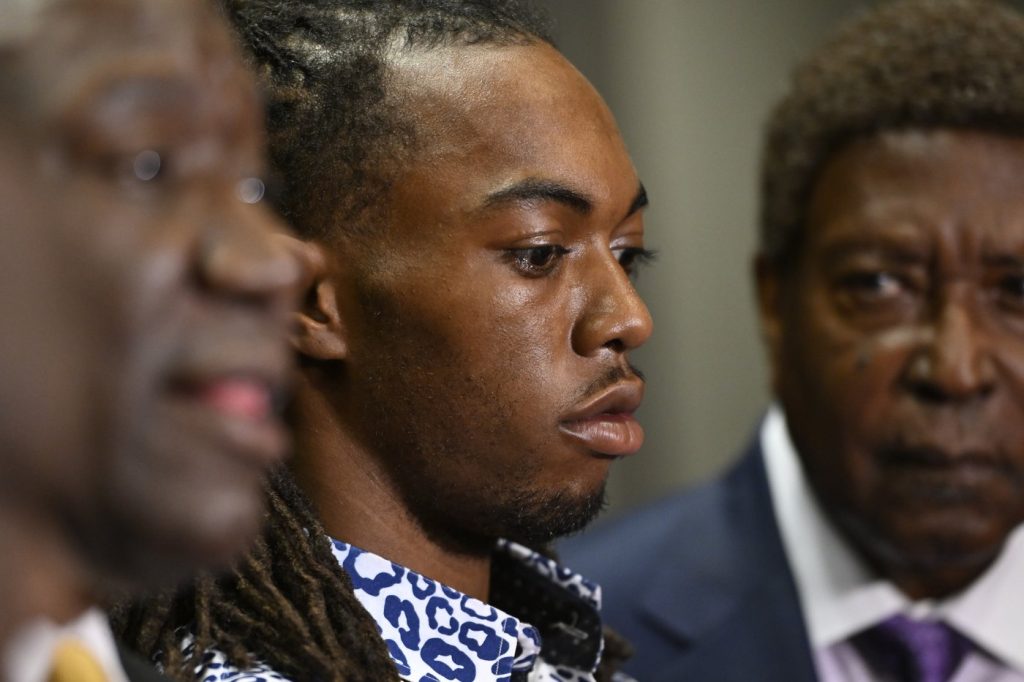World
Florida Student’s Arrest Sparks Outcry and Calls for Camera Use

A video of the violent arrest of a Black college student in Florida has prompted an investigation and sparked discussions about the importance of recording police interactions. The footage, captured by William McNeil Jr. on February 19, 2025, provides critical evidence that contrasts sharply with official police accounts. McNeil’s cellphone camera, mounted above his dashboard, recorded the traffic stop that escalated into a brutal confrontation with law enforcement.
The incident began when officers pulled over McNeil, claiming his headlights should have been on due to poor weather conditions. In the video, McNeil can be heard questioning the officers about his alleged violation. Moments later, an officer shatters his window, strikes him while he remains seated, and forcibly removes him from the vehicle before delivering multiple punches to his head. According to McNeil’s legal counsel, this incident resulted in a brain injury, a broken tooth, and several stitches in his lip.
Civil rights attorney Ben Crump, part of McNeil’s legal team, emphasized the importance of documenting such encounters, stating, “All the young people should be recording these interactions with law enforcement.” He noted that without this footage, the narrative constructed in police reports could misrepresent the reality of incidents involving Black motorists.
Internal Investigation Launched
Following the video’s widespread circulation online, the Jacksonville Sheriff’s Office initiated an internal investigation into the arrest. Although a spokesperson declined to comment on the ongoing investigation due to pending litigation, they stated that no lawsuit has been filed concerning McNeil’s arrest. The police report filed by the officer involved described the use of “physical force” but omitted details of the punches delivered to McNeil’s head.
McNeil’s attorney, Harry Daniels, criticized the sheriff’s office for attempting to obscure the truth, asserting that the traffic stop was racially motivated and unlawful. He described the video as a stark illustration of systemic injustice, stating, “We saw injustice. You saw abuse of police power.”
Technological Solutions for Accountability
The case has reignited discussions about the necessity for motorists to equip their vehicles with cameras. Several experts support the notion that recording police interactions can serve as a protective measure for citizens. Christopher Mercado, a retired lieutenant from the New York Police Department and current adjunct professor at John Jay College of Criminal Justice, encouraged drivers to utilize technology for their safety. He remarked, “There’s nothing nefarious about it. It’s actually a smart thing in my opinion.”
Similarly, Rod Brunson, chair of the Department of Criminology and Criminal Justice at the University of Maryland, noted that recording encounters with police can provide crucial evidence and protect individuals from false allegations. He emphasized that while filming can be beneficial, it should not escalate tensions during police interactions.
Despite the ongoing investigation, Sheriff T.K. Waters has publicly defended the actions of his officers, asserting that McNeil was instructed multiple times to exit his vehicle. He pointed to the discovery of a knife in McNeil’s car as part of the context surrounding the arrest, although McNeil’s video contradicts claims that he reached for the weapon.
The arrest of McNeil parallels past incidents involving recorded police violence, such as the tragic case of Philando Castile, whose girlfriend livestreamed the aftermath of his death during a traffic stop in 2016. These instances highlight how smartphone footage can document events that may differ significantly from official narratives.
As discussions continue about the right to record public interactions with law enforcement, experts stress the importance of balancing this right with ensuring that recordings do not interfere with police duties. The ongoing dialogue reflects a growing recognition of the role that technology can play in promoting transparency and accountability in law enforcement.
-

 Politics4 weeks ago
Politics4 weeks agoSecwepemc First Nation Seeks Aboriginal Title Over Kamloops Area
-

 World5 months ago
World5 months agoScientists Unearth Ancient Antarctic Ice to Unlock Climate Secrets
-

 Entertainment5 months ago
Entertainment5 months agoTrump and McCormick to Announce $70 Billion Energy Investments
-

 Science5 months ago
Science5 months agoFour Astronauts Return to Earth After International Space Station Mission
-

 Lifestyle5 months ago
Lifestyle5 months agoTransLink Launches Food Truck Program to Boost Revenue in Vancouver
-

 Technology3 months ago
Technology3 months agoApple Notes Enhances Functionality with Markdown Support in macOS 26
-

 Lifestyle3 months ago
Lifestyle3 months agoManitoba’s Burger Champion Shines Again Amid Dining Innovations
-

 Top Stories2 months ago
Top Stories2 months agoUrgent Update: Fatal Crash on Highway 99 Claims Life of Pitt Meadows Man
-

 Politics4 months ago
Politics4 months agoUkrainian Tennis Star Elina Svitolina Faces Death Threats Online
-

 Sports5 months ago
Sports5 months agoSearch Underway for Missing Hunter Amid Hokkaido Bear Emergency
-

 Politics5 months ago
Politics5 months agoCarney Engages First Nations Leaders at Development Law Summit
-

 Technology5 months ago
Technology5 months agoFrosthaven Launches Early Access on July 31, 2025





















